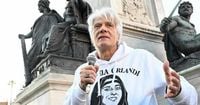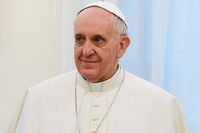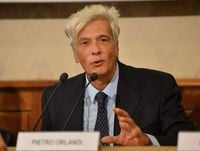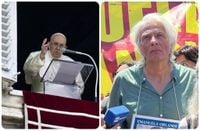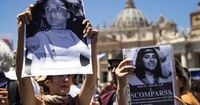In the wake of Pope Francis's recent death, Pietro Orlandi, the brother of the long-missing Emanuela Orlandi, has voiced strong criticism against public figures who he believes have displayed insincerity in their condolences. Orlandi's remarks reflect his ongoing frustration with the lack of transparency surrounding his sister's disappearance, which has haunted Italian society since 1983.
On April 21, 2025, shortly after the announcement of Pope Francis's passing, Pietro Orlandi took to his social media to share his thoughts. "Today, I prefer not to comment; my thoughts are the same as yesterday, today, and will be tomorrow," he stated. This sentiment encapsulates his enduring stance on the matter, which has remained unchanged over the years.
Orlandi did not hold back in criticizing prominent figures from journalism, politics, and culture, suggesting they should have refrained from commenting on the Pope's death. He expressed that in their posts and statements, he perceived "so much hypocrisy, flattery, and falsehood." This pointed critique underscores his discontent with what he sees as empty gestures from influential individuals.
The case of Emanuela Orlandi, who disappeared on June 22, 1983, has remained one of Italy's most notorious unsolved mysteries, intertwining with various institutions, including the Vatican, organized crime, and intelligence services. Over the decades, Pietro has been a relentless advocate for truth and justice regarding his sister's fate.
In his recent commentary, Orlandi also took a moment to celebrate the Natale di Roma (Birthday of Rome), which coincidentally fell on the same day as the Pope's death. He reflected on the historical significance of Rome, stating, "When the current Paris and Berlin were mere underbrush, London a swamp, and the Vatican a health hazard dominated by Nero's circus, Rome already possessed an empire." This juxtaposition highlights Orlandi's pride in the city's rich history, contrasting it with the contemporary challenges it faces.
Orlandi's voice resonates not only for the unresolved case of Emanuela but also as a symbol for those seeking authentic truth in a world often clouded by appearances. The Orlandi case continues to provoke questions and debates, stirring public interest that transcends mere headlines and touches on deeper issues of justice and collective memory.
Reflecting on his past interactions with Pope Francis, Orlandi recalled a poignant moment shortly after the Pope's election when he was told, "Emanuela is in heaven." This statement, while comforting, has left Orlandi with lingering questions about what truly happened to his sister. He has expressed a desire to meet with the Pope again, hoping to gain clarity on the matter. However, he noted that Pope Francis has often cited the overwhelming scrutiny surrounding him as a reason for not being able to meet.
In December 2024, Orlandi shared his disappointment, stating, "He has too many eyes on him to meet with me." This ongoing lack of communication has fueled his frustration, especially as he has sought answers for so long. Just last month, while the Pope was recovering at the Gemelli Hospital, Orlandi expressed hope that the Pope would find the strength to address the questions surrounding Emanuela's case. Unfortunately, with the Pope's passing, those hopes have vanished.
As the third Pope to die without revealing the truth about the Orlandi case, Pope Francis's death leaves Pietro Orlandi and many others grappling with the same unanswered questions that have lingered for decades. The case has become emblematic of a broader struggle for transparency and justice in Italy, with many feeling that the truth remains just out of reach.
Orlandi's commitment to seeking justice for Emanuela has made him a figure of reference for those who believe in the importance of uncovering the truth. His relentless pursuit of answers serves as a reminder of the profound impact that unresolved cases can have on families and society as a whole.
As condolences pour in for Pope Francis, Orlandi's critical voice stands out, urging a more profound reflection on the sincerity of public expressions of grief. His poignant comments challenge the narratives often presented by those in power and highlight the need for genuine empathy and accountability.
In a world where public figures often navigate complex social landscapes, Orlandi's call for authenticity serves as a powerful reminder of the human stories behind the headlines. His continued advocacy for Emanuela's case not only seeks personal closure but also embodies a collective desire for justice that resonates with many.
Ultimately, the legacy of Emanuela Orlandi's disappearance remains a poignant chapter in Italian history, one that continues to inspire questions and evoke emotions. As the search for truth persists, Pietro Orlandi stands firm in his commitment to uncovering the reality behind his sister's fate, refusing to let her memory fade into obscurity.
As Italy reflects on the legacy of Pope Francis and the challenges that lie ahead, the story of Emanuela Orlandi serves as a stark reminder of the importance of truth, justice, and the need for accountability in all corners of society.
